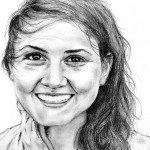In August, I was reading by headlamp in my cabin in the woods of interior Alaska, when a traveler named Mark burst through the door. He was staying on my couch for a few days, and had gone to town that day to see about buying a raft for a backcountry trip he was planning in the Arctic.

Mark told me he had withdrawn all of the money he owned at the time — some $900 — to pay for the raft. He then asked if I knew what it meant when people say “make it rain.” I didn’t, but I soon learned: he showered every dollar he owned over me, swept most of the cash into a pile on the floor, grabbed a lighter from the counter and hovered over the bills, threatening to burn them.
The money survived, un-singed, but we found twenties littered about the cabin like lint for days afterward: stuck under cushions, folded on the floor, crumpled between books. At the time, it was easy for me to believe that wealth had little do with money. That cabin I lived in hadan eighty-acre backyard of wild land, ripe for exploration. I had wood to keep warm, I made my own bread and I did my best to eat out of the backyard, feasting on blueberries, raspberries, rose hips, cabbage, beets, potatoes, snap-peas. I have never felt wealthier than the morning I ate French toast with jam made from just-picked raspberries, still warm off the stove.
In his book “Arctic Dreams,” Barry Lopez questions the definition of wealth by describing encounters between the native Tununirmiut people at Pond’s Bay and European whalers who were exploring the area. The Europeans searched for fortune in northern Canada while the Tununirmiut told them wealth meant having a good family life and being imbued with a “far-reaching and intimate knowledge of one’s homeland.” Lopez asks what it means to grow rich: “Is it to retain a capacity for awe and astonishment in our lives, to continue to hunger after what is genuine and worthy? Is it to live at moral peace with the world?”
These are good questions. What is wealth, anyways, and when do we feel it most? Over the years, I have experienced wealth in various forms, its definition shifting with changes in my own life. I have felt rich in the jungle of Panama watching lightning bugs as big as my fists. At other times, I have felt wealth arrive in the form of meaningful work — those spring days at Yale when I was ruled by the belief that a paper I was writing from the Beinecke archives was the most important thing in the world. Often, I have felt my richest while doing cartwheels on Cross Campus, or laughing around a table with old friends.
At this time of year, as summer internships and consulting firms begin their recruitment, it is easy to make jabs at those dressed in suits, interviewing with various investment banks in WLH or Blue State Coffee. At first glance, it seems that the wealth they are chasing is the kind we most associate with money. But I think that most of those folks are chasing other kinds of wealth, too: a sense of self-worth, challenge, growth, the feeling of contributing some kind of value to a world outside of themselves. What is most worrying to me about the droves of Yalies heading into these fields isn’t necessarily the money; it is whether these students know what wealth means to them personally.
The definition of wealth differs drastically by person, as it should. This is why I am so skeptical when confronted with the sheer number of Yalies choosing the same career paths. Can so many people have settled into one concept of wealth? Am I missing something, since mine is different?
A few days after the “make it rain” incident, Mark and I hitchhiked to a trail where we would backpack for a few days. We were picked up by a young couple. We were sharing stories about Alaskan travels and explaining how we supported our lives there. When it was Mark’s turn, he said he had just graduated college and wasn’t living or working anywhere in particular at the time.
The woman driver smirked and asked, “So you’re just independently wealthy?”
We looked at each other and laughed, recalling the image of his life savings casually strewn about my cabin. “It depends on how you define wealth,” he said. “If monetary, then no. But in other ways, am I independently wealthy? You better believe it.”
Most of us move forward and try to find wealth — we pursue it, chase it, potentially sacrifice our passions and desires for it. For many of us, though, if we take a hard look, we may find the very thing we chase is already around us in spades.
Diana Saverin is a senior in Berkeley College. Her column runs on alternate Fridays. Contact her at diana.saverin@yale.edu.







